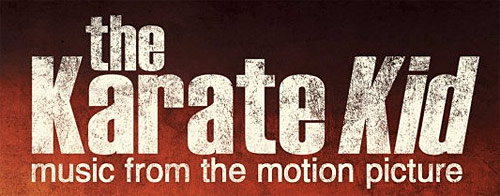
After so many years of ranting against, detesting, abhorring, and otherwise loathing James Horner, I found myself in great enjoyment of his score for Avatar. Sure there were similarities with past works (standard for a Horner score and what I most derided him for), but the pieces came together in a magical and magnificent package.
But could my new-found Horner liking last into another score? His score for the 2010 remake of The Karate Kid would test that liking. The verdict? Yes, another great Horner score. I must be sick.
James Horner’s score for The Karate Kid is terrific, memorable, and balances light-heartedness, tenderness, and otherwise kick-ass-ness.
Originally, Zimmer-goon Atli Örvarsson was to score the film, and we’d likely end up with some half-baked mishmash of crap like Marc Streitenfeld’s Robin Hood score. Thankfully, we are treated to a proper score.
“Leaving Detroit” opens the score with a light and fanciful recurring theme:
/swf/audioPlayer2.swf“Kung Fu Heaven” wouldn’t be out of place in John Debney’s score for The Passion of the Christ:
/swf/audioPlayer2.swf“The Forbidden City” includes some lush string writing:
/swf/audioPlayer2.swfIn “Journey to the Spiritual Mountain,” Horner gives us some sumptuous travel music:
/swf/audioPlayer2.swfI imagine “Hard Training” accompanying a training montage:
/swf/audioPlayer2.swfThen we arrive at the ten-and-a-half-minute “From Master to Student to Master” which is undoubtedly the highlight of the album. Roughly six minutes of the cue is soft, reflective music featuring a lovely solo piano. The rest of the cue is balls-to-the-wall epicness. Horner lets loose with a magnificent, multi-part theme that repeats with varying instrumentation and arrangements. I have no intentions of seeing the film, but I’d love to know what is happening during this cue.
/swf/audioPlayer2.swfThe track concludes with a rousing Horner ending:
/swf/audioPlayer2.swf“Dre’s Gift and Apology” slows things down a bit and reprises on solo piano the theme first heard in the opening track:
/swf/audioPlayer2.swf“Final Contest” gives us another full dose of the epic multi-part theme in “From Master to Student to Master” and splendidly finishes out the album:
/swf/audioPlayer2.swfAs the film takes place in China, Horner takes care to include some Eastern instrumentation. There aren’t any explicitly-Eastern cues, but traditional Chinese instruments are effectively used as texture throughout the score. And as usual, the Japanese shakuhachi Horner’s favorite ethnic instrument makes an appearance in the score.
Always the question with a Horner score is how much did he plagiarize himself. I am surely not a Horner expert and am only familiar with his more mainstream works, but I don’t hear much that jumps out and screams, “Hey! I’m the theme from such-and-such movie that Horner ripped off!” Certainly there are echos of his past works, but this is more likely his writing style coming through (e.g. his crashing pianos make an appearance) rather than a true “Hornerism” of copy-and-pasting himself (surprisingly and thankfully his trademarked four-note danger theme is absent from the album). Even without the self-quoting, this is definitely a Horner score from start to finish.
The Amazon page for the score says, “A release date has not yet been set for this title,” but you can pre-order the score. If you’re not willing to wait indefinitely, you can purchase the score via iTunes.
And you should, because with his score for The Karate Kid, James Horner has provided another terrific score and is slowly making me a believer. His tender, solo piano themes and his epic, full-blown orchestral might leave me wanting more. James Horner kicks-ass with The Karate Kid.
![]()